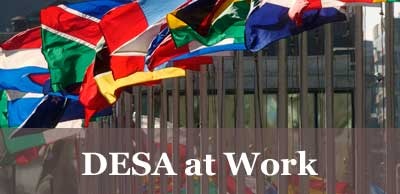

Globe risks “falling back into recession if developed countries embark prematurely on fiscal austerity measures, according to UN Report released December 1, 2011 at UNHQ in NYC. The Report in fact recommends additional stimulus measures as well as more forceful international coordination to stimulate job creation and investment. We have viewed the rush toward fiscal austerity as both dangerous and premature even while it appeared to be in fashion from some in the Eurozone to IMF to US Republican/Tea Party. This was our Coomentary on relative risks right after US debt downgrade presumably for not enough budget reduction in very early August 2011:
The greatest risk probably impacting the markets is a slowdown even perhaps a “double-dip” global recession (on heels of last recession which for housing and employment never ended at least in the US). The austerity being shoved down throats now, the one sided US budget ceiling “compromise,” and the sovereign debt crisis in Europe, already have been pushing economic activity dangerously downward. (Renowned economist Nouriel Roubini perceives same as highest risk).
diplomaticallyincorrect.org/films/blog_post/coordinated-g-7-action-signals-fear-drama-in-financial-markets-by-ambassador-mo/33414
Austerity Hurting Growth & Jobs & Perhaps Counterproductive on Budget Deficit Reduction:
UN Department of Economic and Social Affairs (DESA) alerts that “fiscal austerity measures implemented in developed countries and elsewhere in response to high levels of fiscal deficit and public debt are further weakening growth and job prospects. Failure of policy-makers, especially those in Europe and the United States, to address the jobs crisis and prevent sovereign debt distress and financial sector fragility from escalating, poses the most acute risk for the global economy in the outlook for 2012-2013.”
Calling 2012 a “make-or-break” year for the economy, the report forecasts a “muddle-through” scenario, in which the world economy will continue to grow at a slow pace, at about 2.6 per cent next year and 3.2 per cent for 2013, down from 4.0 per cent in 2010. The Report though is even more negative if the Eurozone debt crisis is not contained, and if further moves toward stringent fiscal austerity in developed countries continue. (Read: -“Global Recession: Best of Times, Worst of Times” -
diplomaticallyincorrect.org/films/blog_post/global-recession-best-of-times-worst-of-times-by-ambassador-mo/36338
“Vicious Circle”:
Report Highlights 4 mutually reinforcing factors that are weakening the global economy:
---sovereign debt distress;
---fragile banking sectors;
---weak aggregate demand associated with fiscal austerity measures and high unemployment; and
---policy paralysis caused by political gridlock.
If any further worsens, the report warns, there is a high risk of setting off “a vicious circle leading to severe financial turmoil and economic downturn.” See from OECD Highly Insightful Film Report – “Economic Risks Downside”-
diplomaticallyincorrect.org/films/movie/economic-risks-downside-oecd/29294
Contagion: Europe & US Intertwined, but Also Impact on Developing/Underdeveloped Economies:
The report stresses that slower growth in developed countries is also affecting developing countries, which have seen a slowing down in their growth since April. “The European Union (EU) and the United States form the two largest economies in the world and they are deeply intertwined. Their problems would easily feed into each other and spread into another global recession. Developing countries, which had rebounded strongly from the global recession of 2009, would be hit through trade and financial channels.” Brazil and Mexico are expected to be more visibly affected by this economic slowdown, while growth in India and China is expected to remain robust. (Read: -Is Eurozone or US in Greater Financial Turmoil?” -
diplomaticallyincorrect.org/films/blog_post/is-eurozone-or-us-in-greater-financial-turmoil-by-ambassador-mo/41996
Jobs Deficit At Least Until 2015?
The report estimates that there was an unemployment deficit of 64 million jobs worldwide this year. This figure refers to the amount of jobs that would need to be created to restore pre-crisis employment levels and absorb young people coming into the workforce. If economic growth stays at current levels, the report estimates the unemployment deficit will not be closed until far beyond 2015. (Read: -“More Jobs Needed or Globe Could Sink into Recession-
diplomaticallyincorrect.org/films/blog_post/more-jobs-needed-or-globe-could-sink-into-recession-social-crisis-un-report-money-flash-by-ambassador-mo/39100). Report urges additional fiscal stimulus measures. Such also would need to be complemented by:
---regulatory reforms to the financial sector,
---increased resources for financial safety nets, and
---measures to prevent a second round of mortgage crises in countries with a high risk of home foreclosure.
To our Readers: We are not repeating the same story from the same source. Rather it is very much the same concern now being perceived by ever more sources from different perspectives and evidence/data!
DESA Report Link: -
www.un.org/en/development/desa/news/policy/risks-for-another-global-downturn-have-heightened.html
By Ambassador Muhamed Sacirbey
Facebook – Become a Fan at “Diplomatically Incorrect”
Twitter – Follow us at DiplomaticallyX
International Financial Crisis Channel -
diplomaticallyincorrect.org/c/international-financial-crisis



